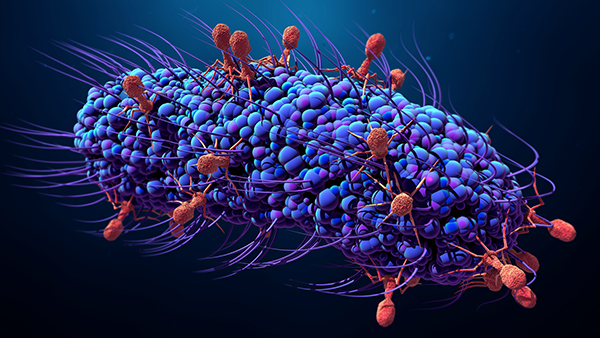Gene editing using the CRISPR-Cas system has exploded with therapeutic potential over the last several years, and while researchers have begun to exploit the bacterial defense system to treat an array of diseases, little is known about the molecular battle between CRISPR and invading viruses. A better understanding of these molecular events could enable therapeutic intervention using phage viruses. Now, two papers publishing simultaneously in Cell by researchers from independent groups provide new evidence of bacteriophage cooperation when attacking CRISPR-containing bacteria.
The findings from the novel studies came from investigators at the University of Exeter through an article titled “Anti-CRISPR Phages Cooperate to Overcome CRISPR-Cas Immunity” and the University of California, San Francisco (UCSF) through an article titled “Bacteriophage Cooperation Suppresses CRISPR-Cas3 and Cas9 Immunity.” The researchers discovered that to overcome destruction by CRISPR, phages have adapted by joining forces to rapidly infect a bacterium, sometimes with one phage sacrificing itself as the primer phage.
“A high enough number of viral particles can tip an attack in their favor,” explains lead investigator in the Exeter study Mariann Landsberger, Ph.D., a research fellow at the University of Exeter’s Penryn Campus in Cornwall. “It appears that a strike against bacteria with a viral number below this ‘tipping point’ leads to extinction of the phage invaders. In contrast, a viral amount exceeding the ‘tipping point’ allows the phages to take over the bacteria together, either by simultaneously or sequentially infecting a given bacterium.”
UCSF researchers unexpectedly discovered that phages cooperate to win the battle of time and numbers against CRISPR. To be an effective immune strategy, CRISPR-containing bacteria must quickly mount a response to phage challenge, and it must do so before the phage kills the cell.
“It is a pretty fast-ticking clock and a numbers game,” notes senior investigator on the UCSF study Joseph Bondy-Denomy, Ph.D., assistant professor at UCSF. “The CRISPR protein has to find the viral DNA very quickly, and if that doesn’t happen, then the virus will proceed and kill the cell.”
The UCSF team looked at Pseudomonas aeruginosa, one of the bacteria known to pre-express a few hundred CRISPR molecules prior to infection. It can act immediately when a single phage genome enters the cell. In some other bacteria, CRISPR is initiated only when infected by a phage.
Each CRISPR protein complex contains a different guide RNA from a group of approximately 30 known guide RNAs in this type of bacteria. For the CRISPR system to be effective, it must find the target matching its guide RNA. Victory for the cell is achieved when the CRISPR machinery with the right guide RNA matches the phage that happens to be infecting at that moment, binds to the phage DNA, and cuts it.
“The challenge for the phage is to produce anti-CRISPR proteins (Acr) very quickly to prevent this cutting from happening,” Dr. Bondy-Denomy remarks, who first discovered anti-CRISPR inhibitor proteins several years ago. In this research, his team discovered that it is was impossible for a single phage genome to produce these anti-CRISPR proteins fast enough because the CRISPR proteins were already waiting.
Dr. Bondy-Denomy adds that “what we think is happening is that the first phage acts like a kamikaze phage. It gets destroyed, but along the way, it starts to produce a few of these anti-CRISPR compounds that will neutralize some CRISPR [proteins] and therefore help its kin, the subsequent phage infection.”
The UCSF researchers believe this phage cooperation is a form of altruism to ensure continued replication inside a host not previously reported in virus or phage models, which are generally considered as inert nucleic acids in a protein shell. They hope this finding will stimulate those working in the viral field, particularly those working on human viruses.
Amazingly, microbiologists at the University of Exeter also discovered that phage particles that infect Pseudomonas aeruginosa bacteria could work together to overcome antiviral CRISPR defenses.
The Exeter team determined that some bacteria with CRISPR machinery are partially immune to anti-CRISPR-encoding phages. They demonstrated that these phages cooperate to overcome CRISPR with a first phage blocking the host CRISPR immune system, leaving behind a CRISPR-immunosuppressed bacterial host in which a second phage can successfully replicate.
Given that a single phage on its own cannot completely overwhelm CRISPR, it takes phage “teamwork” to overcome it and establish an infection in the bacterial population. As the number of CRISPR-immunosuppressed bacterial hosts in the population increase, more and more phage infections are successful, allowing the infection to spread. Consequently, a certain number of phages are initially required to be in the environment for the phage infection to spread through the entire bacterial population. The initial amount of phages that are needed for this to occur marks a tipping point that decides whether the phage keeps replicating or whether the infection will die out.
The Exeter researchers cite this discovery as a breakthrough that may be useful for improving phage therapy, which has long been studied and tested for treating pathogenic bacterial infections.
“The finding that phages act together to disarm bacterial immune systems was very surprising to us and can help to improve strategies to use phages for treating bacterial infections in humans, as the dose of phage that is used in therapy will determine if the phage can successfully eliminate the bacterial infection,” concludes senior investigator on the Exeter study, Stineke Van Houte, Ph.D., an associate research fellow at Exeter University.






